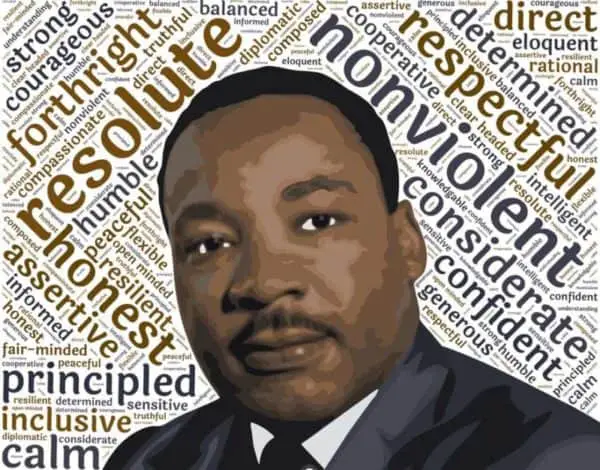TOP 7 Core Interpersonal Skills in Leadership
At any time, a leader is seen as one who guides one or more people to fulfill something stipulated; today, however, we understand that this journey comprises the achievement of results and the evolution, in some way, of all who participate in the process.
Leaders are people with high power to inspire those around them, influence, and guide them in an endeavor that may have personal or professional motivations.
Faced with this, many may think that they do not possess the main characteristics of a good leader. But here is the point: any skill can be developed with willpower; good leaders are constantly polishing their knowledge with time, defeats (and consequent learning), and persistence to try again.
In this article, we will find crucial interpersonal characteristics we need to develop to become leaders.
Today, the leader is an agent of change, someone capable of impacting both his reality and the reality of others through protagonism and execution.
TOP 7 Core Interpersonal Skills in Leadership
1. KNOW HOW TO EMPOWER YOUR TEAM
A great leader believes in his ability to train and develop employees. Therefore, he is willing to empower the people he leads to act with complete autonomy.
He does this by trusting that his team’s employees are fully prepared and empowered to face the new challenges.
Such a leader posture ends up empowering employees so much that organizations that rely on this kind of leadership keep the motivation rate extraordinarily high and, consequently, an excellent performance.
When leadership is well worked, employees grow and end up becoming more proactive in their activities.
A good leader can delegate and guarantee autonomy to his team; he ensures that the group has the confidence to manage its tasks and make decisions independently.
TIPS TO EMPOWER YOUR TEAMWORK
- Use every opportunity that arises to interact, to know the ideas, attitudes, or concerns of your work team;
- Give your team the freedom to solve problems in the work environment, and this challenge encourages them to think outside the box, be more proactive and help each other;
2. EMPATHIZE AND BE UNDERSTANDING
It is a fact that people are different from each other, and a candidate for leader must see this concept.
A leader should know how to extract the best qualities from each team member and constructively expose challenges, spontaneous feedback, and those with an appointment.
A team with diversity will bring new ideas, grow faster, and be better used to promote natural and productive integration.
Being able to express yourself openly and create empathy with others is the foundation of effective leadership. And to achieve that, the secret is simple: listen.
The only way to get people to follow you is to make them feel heard.
Attention: Being empathetic does not necessarily mean being well-disposed and friendly – there are styles of leadership in which this approach makes no sense – it means having the emotional intelligence to understand other people’s position and take that into account.
TIPS TO BECOME EMPATHETIC TOWARDS TEAMMATES
- Listening to people attentively and carefully is the first step to improve and demonstrate your empathy. No use just listening while sharing your attention with the mobile;
- Pay attention to the tone of voice and, if you can see it, to the body language it uses;
- Try to put yourself in someone else’s shoes before you make criticisms or judgments. Choose well the words, indicate paths for it to improve, don’t criticize just for criticizing.
3. BE COMMUNICATIVE
An excellent current leader needs to have good communication skills; after all, it is through communication that ensures correct understanding by all parties and avoids misunderstandings and conflicts.
Leaders must motivate, instruct and discipline the people they are responsible for. They can’t accomplish any of this if they’re not skilled communicators.
It is crucial to have excellent communication skills, but the wrong message can lead to bad results for our building image.
TIPS TO ENSURE GOOD COMMUNICATION:
- Always prefer conversations made in person;
- Maintain visual contact with whoever is speaking;
- Show sincere interest in what the other says.
Check out or article on the 10 Key Characteristics of Good Communication and learn more about how to develop this key skill.
4. EMOTIONAL STABILITY
In addition to being generally reliable, strong leaders are capable of emotional balance; this is both in the sense of understanding what they are feeling and avoiding reactions that can cause harm to the group. Emotional intelligence drives better leaders.
Mental health goes hand in hand with leadership. If you can’t manage your impulses, how can you guide other people to take care of theirs?
The basic rule of Emotional Intelligence is that you can only deal with people’s emotions when you know your own emotions; emotional stability, therefore, begins internally through self-awareness and its effects bring gains for all.
Here are some behaviors of a professional who has emotional stability and its effects on the work environment:
- Recognizes and is true to your feelings and emotions, respecting their limits;
- Respect and understand the emotions and limits of people, seeing everyone as human beings;
- Cultivates internal motivation and does not depend only on external factors to stay motivated;
- Knows how to keep calm in pressure situations;
- Knows how to listen to feedback and use criticism constructively to improve its performance;
- Sees problems as challenges and knows how to find the opportunities behind each one;
- Has empathy, shows interest in the opinion of the other, and considers the feelings of others.
You can learn more about the components or basic elements of emotional intelligence in this article.
5. PRACTICE ACTIVE LISTENING
To lead a team successfully, before knowing how to speak, it is essential to understand how to listen, and this posture demonstrates empathy for the listener. Whether in private conversations or team meetings, exercise listening to have clear, aligned communication.
Active listening is a technique that helps maintain an efficient dialogue, in which the listener can interpret and assimilate all the content expressed by the interlocutor sincerely.
In Dale Carnegie’s book “How to make friends and influence people,” the author brings an interesting thought:
“Talk to someone about yourself, and they will listen to you for hours.”
The ability to listen, rather than speaking, is one of the main points where a leader differs from a boss. By listening to the collaborators, the leader is open to new ideas, opinions, and suggestions. No fear of losing authority by incorporating them into the work.
TIPS TO ACTIVE LISTENING
- If you need to solve a problem, first listen to those involved and then make your considerations, pondering what you heard and passing on your information;
- Avoid distractions at the time of dialogue, so you need to set aside items such as mobile, social networks, emails, side conversations, and phone calls so that you can focus;
- You need to pay attention and devote yourself to the whole speech, ensuring that the information is completely absorbed.
6. INTEGRITY
A good leader should inspire confidence and genuinely motivate his followers to believe in the project. It’s hard to connect with someone who pretends nothing’s wrong when he makes a mistake but is the first and points the finger and demands consequences when someone misses something.
A hierarchical position as a leader, by the nature of its intrinsic functions, constantly puts a leader under his subordinates’ watchful and critical eye.
Thus, and because the example comes from above, it is necessary to know how to admit when you are wrong if you want to be a good leader and not just take a prominent place.
Stephen M.R. Covey, the author of the book “The Power of Trust,” is one of the foremost experts when it comes to trust:
“Keep your promises – it’s the Great Kahuna of all behaviors.”
It’s the fastest way to build trust in any relationship – whether with an employer, boss, team member, provider, spouse, child, or the general public. It’s opposite – failing to keep promises or violating commitments – is undoubtedly the quickest way to destroy trust.”
As Stephen said, regardless of your position or position, fulfilling what you promise is essential to building trust with others. It’s a cycle: from the moment you make promises and keep them, people will consequently associate you with a reliable figure.
7. SHARED DECISION-MAKING
As far as possible, a good leader should summon the team to participate in decision-making. When everyone is involved, a sense of responsibility and participation is created; leadership gains respect and strength.
Decision-making can be defined as selecting a course of action between two or more possible alternatives to solve a given problem.
A good leader is always attentive to the potential of his team members. Therefore, it always promotes the professional growth of each one, assigning challenging tasks that can contribute to the evolution of each employee.
Sitting down and talking with your employees and brainstorming ideas to a problem, and coming up with a solution, would be an inclusive technique to decision-make at work.
Besides mediating a debate of ideas, one of the leader’s functions is to ensure that each participant can contribute to the discussion without favoring a single notion and avoiding judgment and impertinent criticism.
Before closing, I’d like to recommend some of our articles on the topic which should help in adding more examples and tips on how to become a great leader.
-
11 TV Shows to Learn Leadership Lessons
One of the characteristics of a good leader involves constant updating and training to become a better professional every day. Learning about leadership is not always simple, but that doesn’t mean it’s an impossible mission. However, what if this can be done more lightly, combined with leisure? It is not necessary, for example, to get stuck in…
-
How to Identify Leaders? 8 Key Tips
To remain competitive and grow in the market, companies need to develop leaders. Thus, it is necessary to identify talents who have this profile and prepare them to assume management positions. However, how do we train professionals to manage people and processes who still have a strategic view of the business and inspire the teams?…
-
Why invest in Leadership Training? Is it even Worth it?
According to Russo (2005), “the discussion whether leaders are born leaders or learn to be leaders is a long one.” Yet the answer Russo says is straightforward: both statements are factual. The leader must create a healthy environment and interaction and dynamics with the entire work team. It is essential to complete challenges and give…
Conclusion
Leadership and teamwork are directly linked, where the leader is the professional, and the central figure that leads employees in the work processes.
References and Further Reading
11 Good Ways to Set Goals with the TEAM. Ace the Presentation.
8 ESSENTIAL LEADERSHIP COMMUNICATION SKILLS. Havard Business School Online.
How interpersonal skills affect your leadership style. Michael Page.
Top 8 Interpersonal Qualities of Great Leaders. Ace the Presentation.











